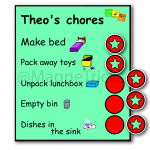Getting kids to willingly contribute
It’s not as difficult as it may seem – there is plenty of psychology involved in encouraging strong willed little humans to do anything. As a teacher I could get 30 kids to do exactly what I wanted them to do when I wanted them to do it – being a mum is a different story! I’ve compiled some strategies that can help you apply teacher brain to the management of your home. You really can get kids positively engaged in chores with a few simple strategies.

Instruction and demonstration
Engage
People do things that they enjoy – it’s fairly simple. Children listen, watch and learn when they’re engaged with their teacher and the content they’re trying to grasp. Cleaning and chores can be off putting for children and adults alike, so make it something they will love.
As an example, a fun and simple way to encourage your children to clean their rooms and make their beds is to pretend their room is flooding and they have minutes to pick everything up and put it away before it’s destroyed. The bed also becomes a life raft, only inflating once the bed is made. It’s silly and might get noisy with possible distractions during the activity, but the entire premise is to help them enjoy their chores and get them done without your assistance.
Games and tricks can be the key to an effective system, and also helps foster imagination. If imagination is not something that would engage your children, music and dance can be a really fantastic chore companion – especially when mum and dad do it too. It’s about finding something that works well for your children and your family, which only you can do.

These sorts of ideas are the entire premise around the show Bluey which is totally awesome. If there’s anything this great Aussie cartoon can teach a parent, it’s that imaginative play can actually make everything less of a chore (including parenting).
Reward, Praise and recognition
Children feed off praise and recognition. They try harder and do more when they know you think they’re capable and know you’re proud. Their job in life is to learn and grow. Your job is to help them do this. Recognising when they achieve something no matter how small is part of this support.
However, all children are different. Some require more positive reinforcement than others and some children need so much that it’s impractical or it can have a negative impact on their ability to cope later in life. You’re the best judge of your children and you’re the best judge of what type of praise will help encourage them. Just make sure you do praise them – it’s easy as a parent to focus on what they need to learn next and not recognise what they’ve just improved on or mastered.
The positive reinforcement you use could consist of verbal praise, reward charts, earning pocket money, earning time doing favourite activities, written praise, etc. Often a simple “Thank you for doing wonderful things” coupled with a smile and a hug can be enough to encourage them further.
It’s about finding something that works well for your children and your family, which only you can do.

Ownership
Allowing your children to ‘own‘ their chores is really important. Anyone who has ever had a three year old or seen one in action knows they like to have control – this does not stop at 3.
Hovering when your children do their chores is really tempting but it contradicts the promotion of self management and independence that we want to teach them. It’s natural for parents to make sure the kids do it and do it well, but hovering to make them do it quicker or right discourages them from wanting to take ownership and responsibility for the tasks. You must resist! Find something distracting, like your own chores or some other activity that you can immerse yourself in until they’re done. I know it often feels like the only way to keep them on task but if your children have tools to help them stay on task or remember what they’re doing, you don’t personally need to keep them on track.
Self management
It’s really important to have systems in place so your children don’t need your help or reminders to complete or remember to start their chores. Routine charts, checklists, clocks, timers, etc can all be great tools to encourage your children to manage it themselves and take control of the task. You’ll also find that reducing the ‘nag’ of your prompts to get things done will increase the impact of your voice and your words when you do need to step up and dish out some instruction. If something isn’t working, consider what you could change or add to increase the level of independence.
Timing
You want your children to succeed with your system, so timing is also really important. Expecting them to complete their chores while their favourite show is on might backfire and discourage them from being interested. Using it as a motivator might also backfire if their minds fixate on what they might miss out on if they take too long. Additionally, it might be harder for them to concentrate when they’re hungry or tired.
After school can also be tricky as they’re craving some ‘chill time’ or just time where they choose their own activities.
So when do you get them to do their chores? Personally, I like to spread some chores out throughout the day. If you have a routine that your children are used to it will become second nature. When I shower in the morning, my girls pick up clothes and make their beds. When we get home from school the first thing they do is complete their school bag check list and unpack their bags. Once they’ve done this the rest of the time is theirs and they do this automatically without instruction. I have a routine chart to prompt them if they forget. Lastly, while I make dinner they tidy the toys and general clutter. This works well because I’m distracted with other chores and they have full control over their jobs.
Whatever you choose, you just need to consider what could possibly distract or motivate your children. It will impact how they react to having the responsibilities.
Balance and equality
Your children shouldn’t spend all of their time at home cleaning and doing chores, and neither should you. Children are very good at picking up when they do more than someone else, but not when someone else does far more than them. With my children it works to have ‘family chores’ that they choose from and we all contribute. This won’t work forever, as soon as someone realises they can do less intensive and time consuming tasks leaving less desirable jobs for others. A good thing to do in this instance is to divide chores between members of the family and always be willing to change/rotate.
Don’t underestimate your children’s abilities to choose jobs that suit them not just because the job is easy. My eldest loves tidying whereas my youngest loves dishes and helping with the clothes. Respecting their preferences will help the system succeed.
Thanks for reading! I hope you have some ideas to get a system working in your home. It is possible to get willing and self motivated helpers in your house – you just need to give them the tools to succeed.




